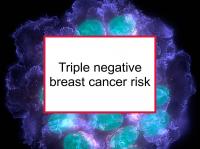Stress and how one deals with it is popularly believed to contribute to breast cancer risk and prognosis. A link to stress or stressful life events appears plausible. Possible mechanisms include immune and endocrine system effects triggered by stress. However, most studies have not found a clear link between stress and breast cancer risk or survival.
Also, the theory that there is a "cancer personality" that makes some people more likely to develop cancer has been disproven to the extent that it can be.
On the other hand, there are some factors related to stress that have been linked by researchers to breast cancer risk or prognosis. Having a supportive spouse appears to confer a better outcome, although losing a life partner does not appear to reduce survival. Losses and trauma in childhood and adolescence appear to be weakly linked to breast cancer risk in adulthood.
Several studies have reported that social isolation promotes mammary tumor growth in mouse models of breast cancer. Now a new study has reported that chemical signals released by breast fat cells might help explain the link between exposure to persistent social isolation or other chronic stressors early in life and breast cancer in adulthood.
Latest research: Mammary fat cells are influenced by social isolation
The study referenced at the beginning of this news story was designed to investigate the effects of persistent social isolation in a mouse model of triple negative triple negative breast cancer. Mice raised in social isolation after weaning were compared to mice raised normally in small groups.
The authors previously reported that the heightened stress response caused by social isolation is associated with increased expression of metabolic genes in mammary glands prior to the development of invasive tumors (in other words, during the carcinoma in situ stage). As a result, socially isolated mice tend to develop significantly larger and more aggressive tumors.
To further understand the mechanism of action of social isolation, the authors separated the mammary gland adipose (fat) tissue from nearby ductal epithelial cells. They then analyzed these cell types for changes in metabolic gene expression. Surprisingly, the authors found increased expression of key metabolic genes in the mammary gland fat cells of socially isolated female mice, but not in the epithelial cells. The increased metabolic gene expression coincided with increased glucose metabolism, lipid synthesis, and leptin secretion from the mammary fat cells, as would be expected. On the other hand, metabolic gene expression was not significantly heightened in the fat depots around internal organs (visceral fat).
Finally, application of media that had been cultured with mammary adipose tissue from isolated mice resulted in increased proliferation of mammary tumor cells compared to media from group-housed mice.
The authors conclude that exposure to persistent social isolation or other chronic stressors result in specific metabolic reprogramming in mammary gland fat cells that in turn promotes increased proliferation of adjacent preinvasive malignant epithelial cells. The authors further comment that metabolites or tumor growth-promoting proteins secreted from fat tissue could potentially identify breast cancer biomarkers or targets for breast cancer prevention.
